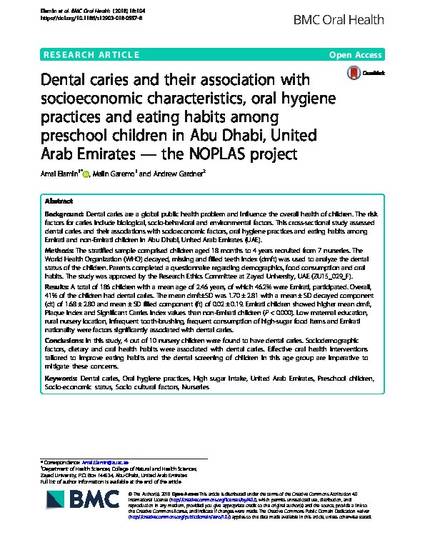
© 2018 The Author(s). Background: Dental caries are a global public health problem and influence the overall health of children. The risk factors for caries include biological, socio-behavioral and environmental factors. This cross-sectional study assessed dental caries and their associations with socioeconomic factors, oral hygiene practices and eating habits among Emirati and non-Emirati children in Abu Dhabi, United Arab Emirates (UAE). Methods: The stratified sample comprised children aged 18months to 4years recruited from 7 nurseries. The World Health Organization (WHO) decayed, missing and filled teeth index (dmft) was used to analyze the dental status of the children. Parents completed a questionnaire regarding demographics, food consumption and oral habits. The study was approved by the Research Ethics Committee at Zayed University, UAE (ZU15_029_F). Results: A total of 186 children with a mean age of 2.46years, of which 46.2% were Emirati, participated. Overall, 41% of the children had dental caries. The mean dmft±SD was 1.70±2.81 with a mean±SD decayed component (dt) of 1.68±2.80 and mean±SD filled component (ft) of 0.02±0.19. Emirati children showed higher mean dmft, Plaque Index and Significant Carries Index values than non-Emirati children (P<0.000). Low maternal education, rural nursery location, infrequent tooth-brushing, frequent consumption of high-sugar food items and Emirati nationality were factors significantly associated with dental caries. Conclusions: In this study, 4 out of 10 nursery children were found to have dental caries. Sociodemographic factors, dietary and oral health habits were associated with dental caries. Effective oral health interventions tailored to improve eating habits and the dental screening of children in this age group are imperative to mitigate these concerns.
- Dental caries,
- High sugar intake,
- Nurseries,
- Oral hygiene practices,
- Preschool children,
- Socio cultural factors,
- Socio-economic status,
- United Arab Emirates
Available at: http://works.bepress.com/amal-elamin/3/